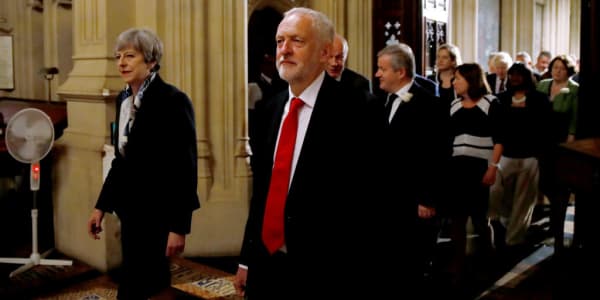The British public has grown accustomed to dire warnings over the Square Mile's fate in a post-Brexit environment, told that the City will become smaller, poorer and less relevant to a global world. HSBC's Douglas Flint summarized the mood when he described U.K. financial services as a Jenga tower, potentially fatally undermined when a stray brick tumbles to Frankfurt or Paris.
This made the tone of leading financiers at the annual City Week conference Thursday all the more remarkable, indicative of a broader sentiment shift that has swept across London in recent weeks. The Chairman of Lloyds Banking Group turned Flint's vivid metaphor on its head, telling the conference that: "rather than a Jenga tower, I think of a Tower of London, with deep foundations." Norman Blackwell went on to highlight the capital's legal expertise, talent pipeline and infrastructure as features that would safeguard its role as Europe's pre-eminent financial hub.
Aberdeen's CEO Martin Gilbert struck a similar note on the panel, choosing to emphasize the fact large asset managers were arguably the sector best prepared for an EU divorce, with his firm already selling funds into Europe from a Luxembourg base. He went on to tell CNBC that while moving functions such as euro-clearing from the U.K. would mean job losses, "this is not a hugely significant point….. it may be a handful of jobs rather than anything more." Catherine McGuinness, Chairman of the City of London Corporation, was equally bullish on jobs, stating that "we are not detecting any great flood of people away from London."

While a few C-suite comments can't mask the fact the bulk of the City is deeply concerned by its future services relationship with Europe, there has been a notable, broad sentiment improvement on the issue. Positioning is key to explaining this, as Joe Prendergast, Head of Financial Market Analysis at Credit Suisse, told CNBC the government's hard-line rhetoric on Brexit negotiations meant much of the downside risk is priced in.
Positive developments, such as the snap election declaration that was widely viewed by traders as heightening prospects for a soft Brexit, have been strongly welcomed by a market conditioned to expect the worst. Sterling reflects this new mood, trading at 1.285 to the USD, up over 6 percent from mid-January's lows. Emmanuel Macron's comfortable victory in the French election has also helped sooth rattled nerves, with the prospect that the benign environment portrayed by the VIX can become reality as political risk subsides.
However, two clouds linger over this less anguished Brexit view. The first is the political profile of the financiers championing it; Lord Blackwell has been a long term, lone advocate of a new European relationship, placing him firmly outside the City mainstream.

Martin Gilbert is known to value cosy relations with government, throwing his weight behind May's Brexit stance earlier this year and cultivating relationship with both Alex Salmon and Nicola Sturgeon in Holyrood.
Euro-clearing is the second shadow troubling this benign outlook with even the most Brussels loathing, EM pivoting City figures accepting that the issue remains a chink in London's Brexit armor. It is increasingly clear to the market that other EU members will try hard to keep euro-clearing inside the European Union.
Many in Brussels have never been happy that the primary center developed outside the euro zone, with few foreseeing in the early 1990's the way the derivatives industry would exponentially expand. European regulators are also anxious for oversight given the systemic risk clearing houses can pose, brought into sharp focus for many bureaucrats in 2011 when the London based LCH suddenly raised margins on Portuguese and Irish debt, sparking further yield spikes in the midst of the euro zone crisis.
Perhaps more comfort could be taken from the subtly more benign view the market and its leaders now advocate on Brexit if troublesome political leanings and daunting technicalities didn't remain in the way.




